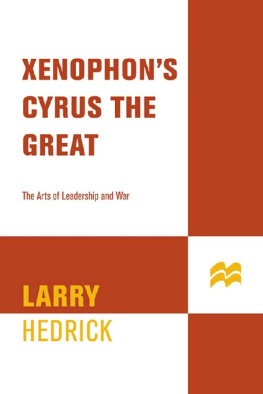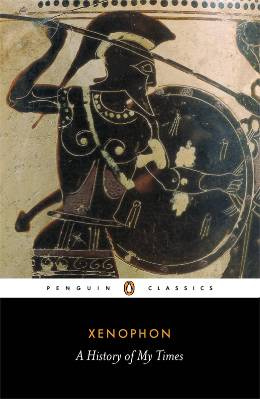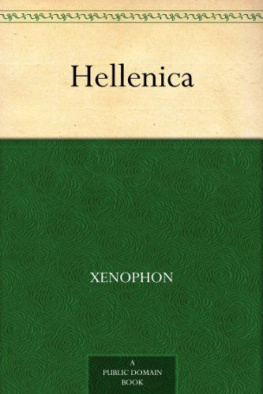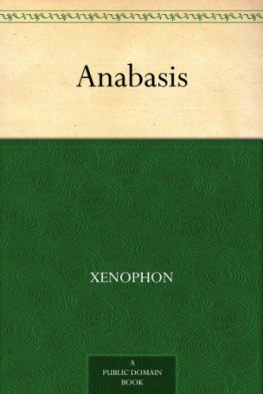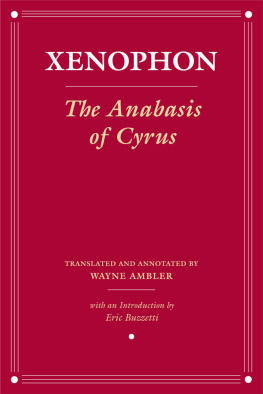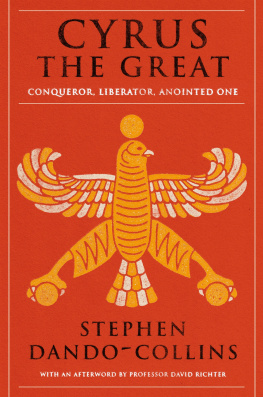XENOPHONS
CYRUS
THE GREAT
_________________________________________
ALSO BY LARRY HEDRICK
Rogues Gallery: Americas Foes from George III to Saddam Hussein

XENOPHONS
CYRUS
THE GREAT
__________________________________________________
THE ARTS
OF LEADERSHIP
AND WAR
__________________________________________________
EDITED AND WITH AN INTRODUCTION BY
LARRY HEDRICK

TRUMAN TALLEY BOOKS
ST. MARTINS PRESS
NEW YORK

XENOPHONS CYRUS THE GREAT. Copyright 2006 by Larry Hedrick. All rights reserved. Printed in the United States of America. No part of this book may be used or reproduced in any manner whatsoever without written permission except in the case of brief quotations embodied in critical articles or reviews. For information, address St. Martins Press, 175 Fifth Avenue, New York, N.Y. 10010.
Medallic portrait of Cyrus the Great on page iv by Bud Wertheimer
www.stmartins.com
LIBRARY OF CONGRESS CATALOGING-IN-PUBLICATION DATA
Xenophon
[Cyropaedia, English Selections]
Xenophons Cyrus the Great : the arts of leadership and war / edited with and introduction by Larry Hedrick.
p. cm.
Based on the 1906 English translation of Henry Graham Dakyns.
ISBN 0-312-35531-9
EAN 978-0-312-35531-9
1. Cyrus, King of Persia, d. 529 B.C. Fiction 2. IranKings and rulersFiction. 3. Leadership. 4. Management. I. Title: Cyrus the Great. II. Hedrick, Larry. III. Title.
PA4494.C7 2006
883'.01dc22
2006040395
First Edition: May 2006
10 9 8 7 6 5 4 3 2 1
To Barb and Marissa
CONTENTS
____________________________________
INTRODUCTION
_____________________________________________________
BY LARRY HEDRICK
X enophon of Athens was a historian and a genuine hero of ancient Greece. Born in 431 B . C ., he was at the height of his powers when he wrote his Cyrus epic. The insights about leadership that are revealed in this book have inspired great men from Julius Caesar to Benjamin Franklin to Lawrence of Arabia.
Far more than most books on leadership, Xenophons masterpiece possesses deeply ethical and profoundly spiritual qualities, which were to be expected from a man who had sat at the feet of Socrates. There is little doubt that Xenophon was remembering the wisdom that he learned from Socrates during his writing of Cyrus.
A descendant of Xenophons manuscript, Cyrus theGreat dramatizes the methods of leadership used by the Persian emperor, who is remembered as the most magnificent monarch of the ancient world. The course of Cyrus the Greats career was triumphant throughout, so this book is, quite simply, one of the greatest success stories ever written.
Cyrus the Great (ca. 580529 B.C.) founded the Persian Empire in the sixth century B.C. by uniting the Medes and the Persians, the two original Iranian tribes. Ultimately, Cyrus Persian Empire extended from India to the Mediterranean Sea and was the most powerful state in the world until its conquest two centuries later by Alexander the Great. Although Cyrus flourished a century before Xenophons own time, he was an apt choice to represent the ideal leader. This great Persians astonishing military successes and mild rule provided just the kind of raw material that Xenophon needed to fashion his portrait of a human paragon.
Plato, another of Socratess celebrated disciples, praised Cyrus the Great as the very model of an enlightened monarch. What Moses was to the Israelites, Cyrus was to the Persians. When Cyrus conquered Babylon, he was cheered by the Hebrews for freeing them from their captivity and allowing more than forty thousand Jews to leave Babylon and return to the Promised Land. Because of his benevolence and his innermost desire to allow mankind to live in peace, Cyrus the Great is immortalized in the opening verses of Isaiah 45.
Even those subjugated by Cyrus the Great considered him an eminently just and upright man. Shapour Suren-Pahlav of the University of London notes that the Persians regarded him as the Father, the Babylonians as the Liberator, the Greeks as the Law-Giver, and the Jews as the Anointed of the Lord.
A document in the form of a cuneiform cylinder was discovered in 1878 during the excavation of a Babylonian site. That document, in which Cyrus describes his humane treatment of the Babylonians after his conquest of the city, is acknowledged as mankinds first charter of human rights. In recognition of this achievement, the United Nations published a translation of Cyrus Human Rights Charter in each of the official U.N. languages.
The historian Will Durant points out that Cyrus the Great was the most amiable of conquerors, and founded his empire upon generosity. His enemies knew that he was lenient, and they did not fight him with that desperate courage which men show when their only choice is to kill or die.
No other leader throughout antiquity can match the scope of Cyrus achievements. Though Alexander the Great (356323 B.C.) is sometimes considered to be a greater military tactician, he indulged in excesses that would have made Cyrus the Great blanch.
Whereas Cyrus treated the peoples he conquered with deep respect, Alexander sometimes urged his soldiers to put civilian populations to the sword. As his domains widened, Alexander increasingly gave himself over to tyrannical methods and monstrous egotism. Had any of Cyrus generals acted with a cruelty equal to Alexanders, he would have been relieved of his duties immediately.
A deeply humane man in his own right, Xenophon would have found it natural to develop a sense of spiritual kinship with the founder of the Persian Empire. They both had many opportunities to master the military virtues: Xenophons own leadership skills were sharpened during his service as a battlefield commander where indecision would have meant defeat and death.
Using his renowned eloquence as well as his reputation for personal integrity, Xenophon also excelled as a diplomat and peacemaker. He found it natural to work hand in hand with the Persians who controlled the Greek cities in the western part of what is today Turkey.
Xenophons approach to Cyrus was broadly creative rather than narrowly historical. He was far less interested in presenting the plain facts of Cyrus biography than in showing how a visionary leader can provide a strenuous and rewarding life for his lieutenants as well as a secure and comfortable existence for his subjects.
In dramatizing Cyrus victorious methods, Xenophon shows you how to conduct meetings, become an expert negotiator, deal efficiently with allies, communicate by appealing to the self-interest of your followers, encourage the highest standards of performance, ensure that your organization has the benefit of specialists, and prove that your words will be backed by your deeds. Those in business can benefit from the rules laid down in Cyrus the Great.
Everywhere in Cyrus imperial enterprise are striking parallels to situations that business managers confront on a daily basis. As portrayed by Xenophon, Cyrus is both a strategist and a tactician; he plans like a CEO but monitors operations like a middle manager. Therefore, you can apply his lessons across the full spectrum of business life, and it will be both instructive and entertaining to find similarities between Cyrus career and your own.
Next page
